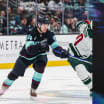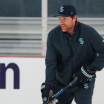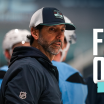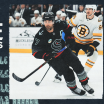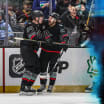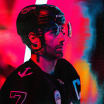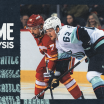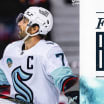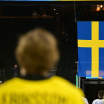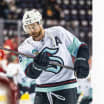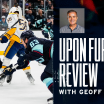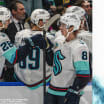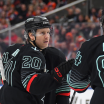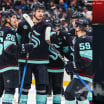NHL transaction activity slows down every August but never quite stops. This month is no exception. But, first, allow me to write in the first person about a hockey hero who left this world too soon last week.
Let's the drop the
WaFd Bank
Weekly Warmup puck:
WaFd Bank Weekly Warmup: Aug. 16
The hockey world loses an Esposito brother as goalies everywhere mourn. Plus, three big-name NHLers sign contracts in last few days
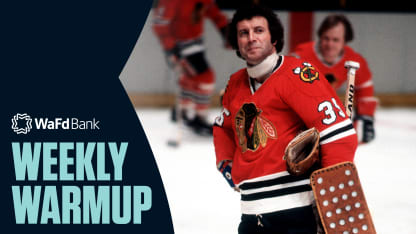
Ode to 'Tony O'
As a Chicago kid and goalie (hockey and soccer), there are a number of Chicago Blackhawks goalies who are touchstones for me and every Chicago boy and girl who chose the position -- or had the position chosen for them.
The lineage starts with the lore of Glenn Hall, who played 502 consecutive games and helped Chicago win the 1961 Stanley Cup, playing every regular-season and playoff game to help Chicago to win its first title since 1938.
The late Tony Esposito showed up as a rookie for the 1969-70 season (picked up on waivers when the Montreal Canadiens protected Gump Worsley and Rogie Vachon) and didn't give up the net for 15 seasons, arguably surpassing Hall as the franchise's best all-time goalie.
Esposito's first Chicago year featured record-setting 15 shutouts, a 2.17 goals-against average, 38-17 regular-season record and playoff berth for a last-place team the season before, plus two trophies, the Calder for rookie of the year and the Vezina as the league's best goalie. There were more Vezinas and standout years to come.
But other Chicago garden-variety goalies might well their catch-glove hands in protest on behalf of their all-time favorites: What about Eddie Belfour, who notched 43 wins in his 1990-91 rookie season with the franchise to win the Calder and Vezina himself? Then, like Esposito, taking the Blackhawks to the Stanley Cup Final in his sophomore NHL season.
Or, hey, come on, Corey Crawford, honed his craft in the Chicago developmental system, then delivered two Stanley Cups in 2013 and 2015.
Esposito, affectionately known as "Tony O," died from pancreatic cancer last Tuesday at 78. That's why two of my closest friends (one high school, one college) texted me condolences within minutes of each other, knowing I would be instantly grieving upon the news.
They were right. Gut punch.
I never met Esposito growing up, but I watched nearly every Saturday night road game he ever played (my own ritual as a little guy, mimicking our northern neighbor's "Hockey Night in Canada" tradition) and lots of other road contests.
I listened on the radio to most of Esposito's home-game starring acts because the late Bill Wirtz resisted televising home games in an effort to keep fans attending in person (another story for another column).
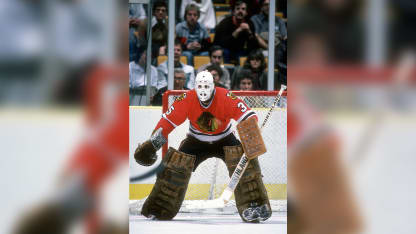
My father knew my obsession with the goaltender position and made it a point to take me to two or three "Hawks" games every winter. Magical nights, so many great "Espo" saves, thunderous ovations, at least four shutouts over the years if I recall correctly. The Tony-O thing is 0 as in zero goal but it did have a nice double-entendre effect given his surname.
My affection for Esposito was deepened when I discovered his back story, which included growing up as the designated goalie in the driveway for older brother Phil. They grew up to be fellow Hockey Hall of Famers from Sault Ste Marie, Ont., followed two decades by another "Soo" native, Kraken GM Ron Francis.
My goalie days were formed as a third-grader also making saves at my older brother Jim's behest, playing in eighth-grade pickup games and shooting sessions at our local outdoor rink (a blacktop combination basketball/16-inch softball surface with a lip to freeze hosed-in ice during colder months).
I never met Esposito as a kid. But I got my chance on the first day of 2009 when I was pinching myself at Wrigley Field covering the Winter Classic between Chicago and the Detroit Red Wings as the editor in chief of NHL.com.
As it happened, I was in the press area during an intermission visiting with a dear friend and former colleague, Chicago Tribune columnist Bob Verdi. He took me by the arm back to a private room.
Verdi opened the door and I spied Esposito with long-ago Chicago winger Bobby Hull, Chicago Cubs pitcher Fergie Jenkins (a Canadian who played hockey superbly as a teen) and Cubs Hall of Fame second baseman Ryne Sandberg. They were getting ready to sing "Take Me Out to the Ballgame" from a broadcast booth, the same one used for baseball games.
I shook hands with Esposito and then Jenkins, both athletes I deeply admired for their character even more than sporting performances. What I remember thinking about meeting Esposito: Total gentleman, all class and, oh my god, I just met Tony-O!.
There is so much more to say about Esposito, but I defer to my friend "Verd," who is in the Hockey Hall of Fame himself as a writer and these days writing as team historian for the Blackhawks. Here's a
link
to Verdi's column about Esposito plus this excerpt involving a conversation with heartbroken brother Phil:
"A native of Sault Ste. Marie, Ontario, Tony Esposito attended Michigan Tech. Hundreds of current players in the National Hockey League hail from American colleges, but he was among the initial wave [the third ever] when signed by the Montreal Canadiens. His first start occurred during the 1968-69 season against Phil's Boston Bruins, and it ended 2-2.
" 'I got a call from our parents after the game,' Phil recalled. 'They wanted to know how Tony did. I told them, good, real good. Second star.'
" 'Frances, my mother, asked who scored the first goal against him. I told her I did. She said well, that's OK, you're his brother. Then she asked, who scored the second goal? I said, well, I got that one too. She said, 'How the hell can you do that to your brother?' She didn't talk to me for two weeks.'
"The Canadiens were loaded at the position with standbys Rogie Vachon and Gump Worsley. Thus the Blackhawks, two years after regrettably trading Phil to Boston, where he blossomed into a superstar, acquired Tony for the waiver price of $25,000. That sum was not pocket change at the time, and even General Manager Tommy Ivan could not have imagined he would secure a heritage goalie for a decade and a half."
Tracking Transactions
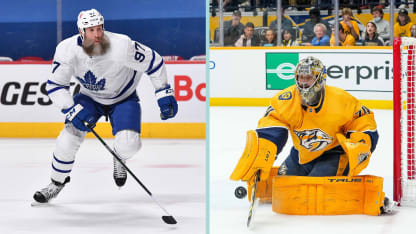
Three prominent NHLers signed contracts in the past several days: 42-year-old Joe Thornton changed teams while Nashville goalie Juuse Saros and Minnesota forward Kevin Fiala avoided arbitration with their current teams:
Thornton agreed to a one-year contract Friday with the Florida Panthers, his fourth franchise. Financial terms were not disclosed.
"I see their team on paper, I watched their team last year, I love their team and that's it," Thornton said about where he will play his 24th NHL season. "I love what they're building and excited to be part of it. But everything is about ultimately winning the Stanley Cup and the Panthers are right there, in my opinion."
Thornton is 14th on the NHL scoring list with 1,529 points (425 goals, 1,104 assists), seventh in assists and sixth in games played (1,680). He has played 23 seasons with the Toronto Maple Leafs, San Jose Sharks and Boston Bruins (who drafted him in 1997). He has scored 134 points (32 G, 102 A) in 186 playoff games.
Soros signed a four-year, $20 million, $5 million average annual value (AAV) contract with the Nashville Predators Monday. The 26-year-old goalie, a restricted free agent, avoided a salary arbitration hearing scheduled for Wednesday.
"Juuse has proven himself as one of the best young goaltenders in the NHL, and we are very pleased to have him remain our No. 1 goaltender for years to come," said David Poile, Predators general manager.
Another restricted free agent, Fiala, ended protracted negotiations with the Wild, agreeing to a one-year, $5.1 million AAV contract Monday. His arbitration hearing was slated for Tuesday.
"We would have loved to get Kevin on a longer-term deal," said Wild GM Bill Guerin about his star forward who scored 20 goals and added 20 assists in 50 games last season. "But after a while, in going back and forth, it just seemed like we weren't going to be able to get anything done. With the arbitration date coming, it just worked out we could settle on a one-year deal."

